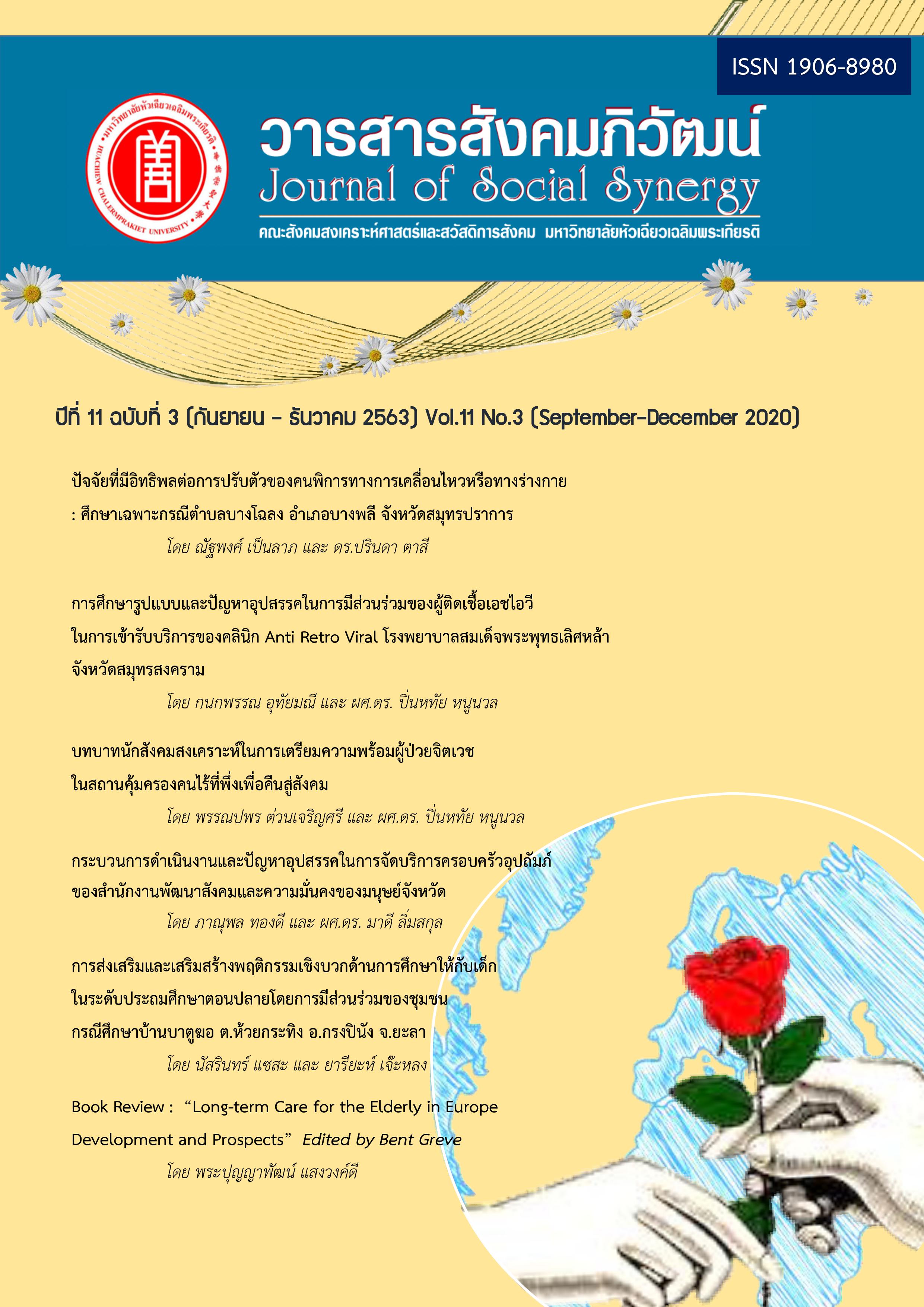The Community-Based Enhancement of Upper Elementary Students’ Positive Educational Behavior: A Case Study of Ban Batuga Village, Huay Krathing, Krong Pinang, Yala
Keywords:
Positive Behaviors, Education, High schoolAbstract
Currently, children and youth are facing several challenging problems, such as drugs, premature sexualization, violence, and the addictive use of online media leading to negative consequences. For example, in terms of education, the problems have impacted on school absenteeism, dropouts, class skipping, lacking concentration and motivation, or lacking financial support in pursuing higher education among children. The afore mentioned problems have brought about dramatic effect on the children and youth's quality of life including the population quality, and eventually on the nation's future. As a matter of fact, today's youth are tomorrow's adults.
Located in Huay Krathing sub-district, Krong Pinang district, Yala province, Ban Batuga village is a community experiencing children and youth's educational issues. From the focus group interview session among students, it was found that one of the school absenteeism causes is the addiction to online games and smart phones which can be considered as another major problem apart from the economic problem and insurgency situation. Besides, easy and unrestricted access to online media in modern times has resulted in more negative behavioral changes among children and youth, for instance, staying active and late at night but passive or absent from school due to addiction to online games or social media.
Based on these concerns, this study, therefore, aimed at enhancing and building upper elementary students' positive educational behavior. It was also to promote community involvement in developing students' positive behaviors. The primary target participants in this study included 40 upper elementary students aged 9 - 12, and the secondary target group was 10 community leaders, 20 parents, and 20 local people. The research was conducted by establishing a community steering committee to investigate the number of students having negative educational behavior such as being absent, skipping class, or having school dropouts. Then, the meeting between the community committee and relevant parties was organized to find out mutual solutions, to plan for the strategies handling the problems, and to seek financial support for the students' education. From the finding, it is shown that the students' motivation both in secular and religious learning has been strengthened. Furthermore, the creative community space in providing the children the opportunity to learn, to share, and to show creative activities, has been established. Also, there was cooperation between the community and third-party organizations in creating creative activities to develop the students' ability, as well as cooperating with schools in recruiting children to access the compulsory basic education. Moreover, the community leadership team has also launched financial support for education to the orphans and children in need in the community.
References
พระราชบัญญัติคุ้มครองเด็ก พ.ศ.2546. (2546, 2 ตุลาคม). ราชกิจจานุเบกษา. เล่ม 120 ตอนที่ 95 ก. หน้า 1-29.
พร้อมพิไล บัวสุวรรณ. (2554). ผู้ปกครองและผู้เรียนหุ้นส่วนเพื่อคุณภาพของผู้เรียน. กรุงเทพฯ: แสงดาว.
รัฐธรรมนูญแห่งราชอาณาจักรไทย พ.ศ.2550. (2550, 24 สิงหาคม. ราชกิจจานุเบกษา. เล่ม 124 ตอนที่ 47 ก. หน้า 1-127.
รัศมี ศรีนนท์ และคณะ. (2561). การจัดการเรียนรู้เชิงรุกในยุคไทยแลนด์ 4.0. วารสารการบริหารการศึกษา มหาวิทยาลัยศิลปากร, 9(2) : 331-343.
ศิริกาญจน์ โกสุมภ์. (2542). การมีส่วนร่วมของชุมชนและโรงเรียนเพื่อจัดการศึกษาขั้นพื้นฐาน.
(วิทยานิพนธ์ปริญญาการศึกษาดุษฎีบัณฑิต). กรุงเทพฯ : มหาวิทยาศรีนครินทรวิโรฒ.
สถาบันบัณฑิตพัฒนบริหารศาสตร์. (2560). การศึกษากับปัญหาของเยาวชนไทย. สืบค้นเมื่อวันที่ 12 ธันวาคม 2562 จาก http://nidapoll.nida.ac.th/index.php?op=polls-detail&id=110
สำนักงานคณะกรรมการการศึกษาแห่งชาติ.(2544). คู่มือการดำเนินงานเครือข่ายพ่อแม่ ผู้ปกครอง เพื่อปฏิรูปการเรียนรู้. กรุงเทพฯ : วัฒนาพานิช.
อคิน รพีพัฒน์. (2527). การมีส่วนร่วมของชุมชนในสภาพสังคมและวัฒนธรรมไทยในการมีส่วนร่วมของประชาชน
ในการพัฒนา. กรุงเทพฯ : ศักดิ์โสภาการพิมพ์.
Downloads
Published
How to Cite
Issue
Section
License
บทความที่ได้รับการตีพิมพ์เป็นลิขสิทธิ์ของวารสารสังคมภิวัฒน์ มหาวิทยาลัยหัวเฉียวเฉลิมพระเกียรติ
ข้อความที่ปรากฏในบทความแต่ละเรื่องในวารสารวิชาการเล่มนี้เป็นความคิดเห็นส่วนตัวของผู้เขียนแต่ละท่านไม่เกี่ยวข้องกับมหาวิทยาลัยหัวเฉียวเฉลิมพระเกียรติ และคณาจารย์ท่านอื่นๆในมหาวิทยาลัยฯ แต่อย่างใด ความรับผิดชอบองค์ประกอบทั้งหมดของบทความแต่ละเรื่องเป็นของผู้เขียนแต่ละท่าน หากมีความผิดพลาดใดๆ ผู้เขียนแต่ละท่านจะรับผิดชอบบทความของตนเองแต่ผู้เดียว




